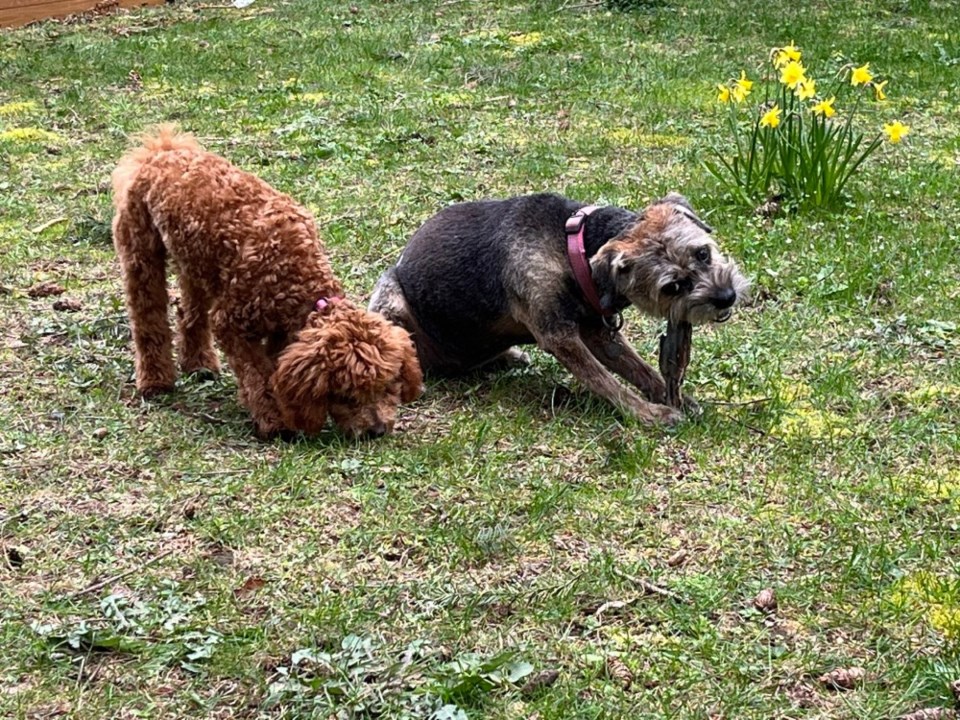Recently, there has been some comment on an article in this space about a topic that’s very dear to a lot of hearts: when our pets – and other animals -- die, do they go to heaven?
The timing of the publication was amazing, as I saw it the day after we said goodbye to Millie, our 13-year-old border terrier. As she slipped away, we both said, “We’ll see you again!”
Will we?
I once heard a Southern Baptist minister say, rather condescendingly, “Well, I let them believe that, if it makes them feel better, but really: animals don’t have souls, so they wouldn’t go to heaven.”
No souls?
There is evidence, empirical, Biblical and even eyewitness (!) that animals do have souls, and even if not, they have a place in heaven.
The eyewitness account comes from Dean A. Braxton, who was clinically dead for an hour and 45 minutes, He wrote about what he experienced during that time in a multi-book series, Moments in Heaven. (Full disclosure: I narrated the audiobook version of Part 8, “Deep Worship in Heaven”.) He says he saw animals arriving in heaven, including pets.
No souls? Let’s look at the evidence of our own experiences. Millie, for example, could read our moods: there were occasions when I would be sad about something, and she would simply come and sit beside me, leaning against me. Cats, for all their aloof attitude, will recognize when something is “off” with their owners, and “do their duty”, which is to curl up beside them and purr.
Of course, there’s the “welcome home” dance; the fact that Millie could pick out my or Amelia’s voice in a crowded airport; the excitement she and our other dog, Joy, show when they sense our car approaching when it’s still a block away: all those suggest a connection that transcends obedience training and dried-liver treats.
No soul? Really?
In the Bible, the book of Ecclesiastes leans towards confirmation that animals have a soul, while leaving the question, ultimately, to God. “the [earthly] fate of the sons of men and the fate of animals is the same ... they all have the same breath and there is no preeminence or advantage for man [in and of himself] over an animal … Who knows if the spirit of man ascends upward and the spirit of the animal descends downward to the earth?” (Eccl. 3:19-21 Amplified – my edits).
One of the Proverbs indicates that a measure of a person’s character is found in the way one treats animals. “The righteous [one] considers the welfare of [their] beast; but the tender mercies of the wicked are cruel.” (Prov. 12:10)
In the laws given to Moses in the Book of Exodus, animals are held accountable for their actions. Specifically, the law states that if an ox gores a person to death, the ox must be killed; and if the ox had shown a tendency to do that in the past, the owner is to be executed, as well. Now, I’ve been known to be wrong (it happens), but that suggests to me that a sense of right and wrong is instilled in animals, and if they overstep the boundaries, they pay the price.
Psalm 36 states that the Lord “preserves man and beast” (v.6) and in the very last line of the Book of Jonah, God asks why He should not have pity on the people of Nineveh, who don’t know their right hand from their left – and much livestock. Evidently, He needed to remind Jonah that where was livestock in Nineveh, as well as humans, that had to be considered..
For all this, the fact remains that the book of Genesis tells us that, when God created all the animals – even before creating humans – He saw that it was good. Of course, He’d want those creatures with Him in His kingdom.
So, to all of us who have said goodbye to our beloved non-human companions, I have no qualms in declaring that, yes, we will meet them again.
Drew Snider is a pastor at the Mustard Seed Street Church and recipient of the Times 91įŁ┤┤ 'Community Contribution' Award at the 2023-24 University of Victoria Athletics Celebration of Excellence.
You can read more articles on our interfaith blog, Spiritually Speaking, at



